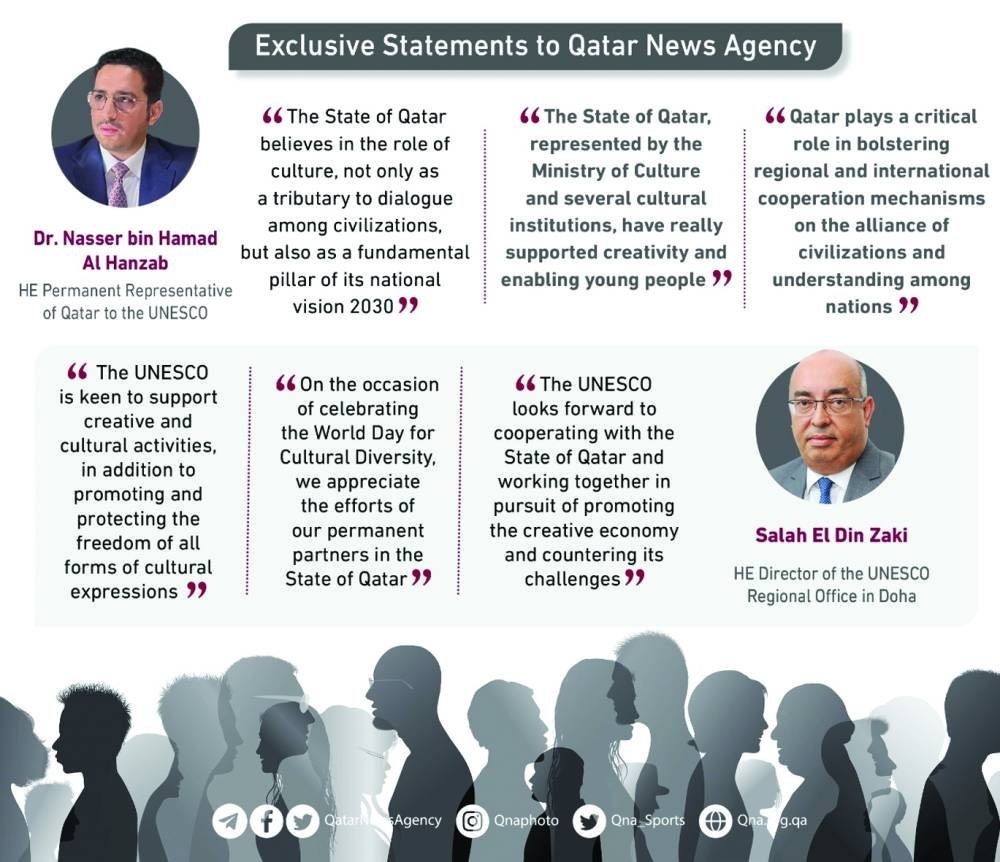Qatari and international officials underlined that Qatar has succeeded in promoting the cultural diversity to be a critical tributary for sustainable development. Talking to Qatar News Agency (QNA) on the World Day for Cultural Diversity for Dialogue and Development which is marked on May 21 each year, they noted Qatar's interest in promoting coexistence, alliance of civilisations, right to cultural diversity and enhance innovation that contributes to development.
HE the Permanent Representative of Qatar to the Unesco Dr Nasser bin Hamad al-Hanzab said Qatar believes in the role of culture, not only as a tributary to dialogue among civilisations, but also as a fundamental pillar of its National Vision 2030, along with the sustainable development goals 2030 that was endorsed by the UN in 2015.
The Ministry of Culture and several cultural institutions such as Qatar Museums and the Cultural Village Foundation (Katara) have supported creativity such as art, diverse cultural activities, crafts, music and plastic art, Dr al-Hanzab pointed out, adding that Qatar has dedicated the general art and creativity to them rendering them ubiquitous across the country.
He said that Qatar has presented a model to the international community on the methods of achieving the sustainable development goals through supporting young people to engage in cultural and innovative activities until some of their arts become globalised, including the support provided by the Doha Film Institute to young people in Qatar to refine their artistic talents through local and international engagements.
This support has an essential role in bolstering the culture's role in achieving the national development and promoting Qatar's cultural role at the international level, he noted. Dr al-Hanzab emphasised that Qatar strives to promote the cultural diversity in development fields through its national policies and vision and has provided the conducive environment for creativity through a wide spectrum of cultural institutions operating in various fields.
Qatar is one of the countries that supports the Unesco's plans and programmes regarding the sector of culture, he noted, adding that Qatar joined the Convention on the Protection and Promotion of the Diversity of Cultural Expressions of 2005 on April 21, 2009, and is a key partner of Unesco through its multiple initiatives and comprehensive commitments in co-operation with the international community.
He pointed out that Qatar plays a critical role in bolstering regional and international co-operation mechanisms on the alliance of civilisations and understanding among nations, as well as Qatar's contribution to the International Fund for Cultural Diversity (IFCD) that was established in 2010 to support and implement the Convention on the Protection and Promotion of the Diversity of Cultural Expressions in the developing countries, in addition to implementing numerous programs worldwide to support the members states.
He pointed out that such contribution has led to Qatar being elected as member in the Unesco Intergovernmental Committee (IGC) for the Protection and Promotion of the Diversity of Cultural Expressions in 2019, for the period 2019-2023, to resume the position of the chairman of the 15th session of the IGC in 2022.
In addition, Dr al-Hanzab noted Qatar's efforts and support afforded to the Unesco in the context of its membership in this convention as one of the international decision makers in cultural diversity which underscores the cultural dimension of Qatar's vision and its orientation towards this diversity, he said.
He affirmed that Qatar plays a pivotal role in bolstering regional and international mechanisms through multiple initiatives such as the Sheikh Hamad Award for Translation and International understanding and others, lauding Qatar's success in presenting a landmark edition of the World Cup 2022, stressing that the world appreciated the dazzling activities and a wide range of cultural events that were provided by Qatar making such an edition excellent in terms of culture.
For his part, the Director of the Unesco Regional Office in Doha, Salah El Din Zaki Khaled, asserted the Unesco's keenness to support creative and cultural activities, in addition to promoting and protecting the freedom of all forms of cultural expressions in light of a consolidated conviction that investment in creativity can change communities, making them meaningful and more inclusive.
Culture is an active and vital driver for sustainable development and is essential to achieve the sustainable development goals of 2030, he pointed out, adding that culture contributes to human, social and economic development, as well as good education, social integration, sustainable cities, and environment etc.
He praised the efforts undertaken by Qatar in improving the career, social and economic status for the artists and those who work in the sector of culture whether in Qatar or other countries, noting that Doha has joined the network of the creative cities in design area, along with its participation in the Unesco World Conference on Cultural Policies and Sustainable Development MONDIACULT 2022- that was held in Mexico.
He hailed the burgeoning artistic and creative movement that has evolved in Qatar in the recent years, either through the efforts made by the Ministry of Culture, or the Qatar Museums which leads several initiatives in the areas of culture, arts and creativity promoting Qatar's outstanding role in rapprochement and inter-cultural dialogue.
Khaled said the Unesco looks forward to co-operating with Qatar and working together in pursuit of promoting the creative economy and countering its challenges, pointing out that the Unesco's celebration of this day on May 21, each year is not essentially dedicated to highlighting the world's rich cultures, but rather to emphasising the fundamental role of intercultural dialogue in achieving peace and sustainable development.

